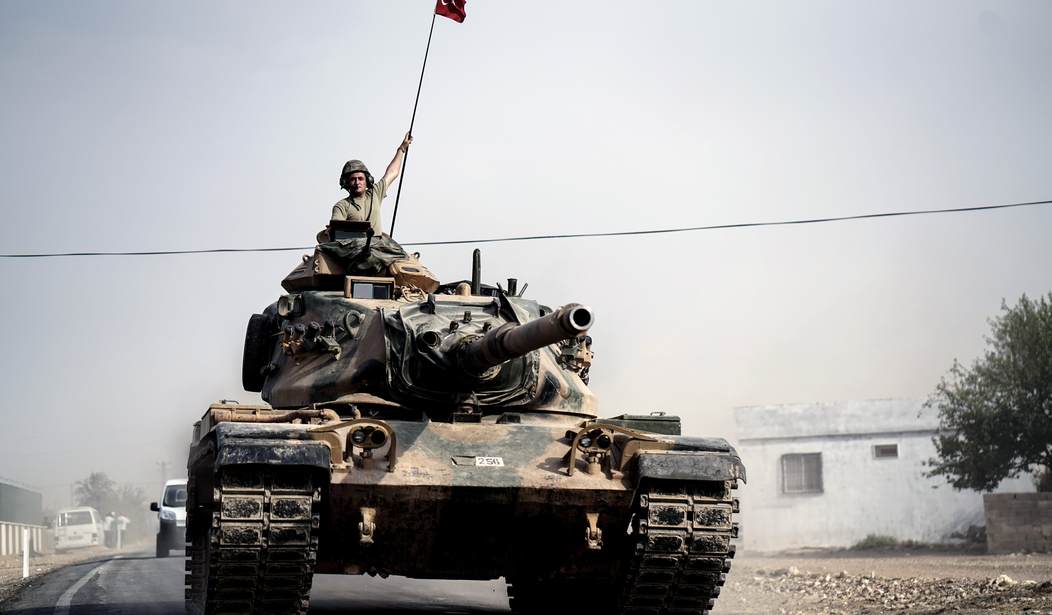Shortly after Turkey launched an offensive into northern Syria, it became clear that the political situation in the Middle East had changed dramatically.
David Kaufman writes:
The day after it agreed to rapprochement with Israel (June 27), President Erdogan sent a letter to President Putin offering regrets for the November downing of a Russian aircraft and seeking to reestablish relations with Russia. In the intervening weeks, it appears that Turkey has practically abandoned Hamas, after being one of its primary advocates for years. That was almost certainly a concession in negotiations between Israel and Turkey, which brings up what Israel actually offered.
Israel likely offered to aid in reconciliation with Russia. That would explain the immediate and rapid development of that reconciliation in late June. Turkey not only needed help to avoid that relationship worsening, but it needed to seek a major concession from Russia, namely, as we found out today, the ability to launch a ground offensive within Syrian borders against Islamic State forces and Syrian Kurdish forces.
If you had said that Turkey would invade Syrian territory at any point before now, it would have seemed insane. The Assad regime is a Russian ally and having NATO forces operating on the soil of a close Russian ally would have been difficult to conceive. But not at this point because relations between Russia, Turkey, the US and the Kurds are now different. Israel and the US must have agreed to not support the Kurds in Syria against Turkey. Today, Vice President Biden announced that “Washington made clear to pro-Kurdish forces in Syria that they must not cross west of the Euphrates River” or lose US support. It is likely that Israel is also part of that agreement.
This is a major change from the status quo. In the past, the United States was the main outside power operating in the Middle East. It now seems that this role has increasingly been taken over by Russia.
Meanwhile, Israel and Egypt have reached out to Vladimir Putin in response to an overture that Russia might help to moderate Israeli-Palestinian negotiations. Israeli relations with Russia are now substantially strong with Putin and Netanyahu pledging to continue “intensive” contacts. Russia not only gets Israeli intelligence help and cooperation in combating Islamist elements in Syria, Chechnya, and in Russia proper, but also in regard to strengthening relations with Former Soviet Union FSU nations. Beginning with the Russian aliyah of the 1990s, Israel now has over one million citizens who were born in the Soviet Union, a high percentage of whom are from Russia as such, and extensive economic and social ties with Russia and other FSU nations.
Israel’s defense minister, Avigdor Lieberman, is Russian-born and, therefore, a Russian speaker. Because of his involvement in the Israeli government, ties between Russia and Israel will become even closer. In return for Israeli support, Russia will keep tabs on Iran, making sure the mad mullahs don’t actually follow through on their threat to wipe the Jewish state “off the face of the map.”
It goes without saying that these are very troubling developments. The United States is forsaking its duty in the Middle East, while Russia is more than happy to step into the power vacuum created by Obama’s withdrawal. That’s a major problem because Russia is one of the West’s most important — perhaps even the single most important — geopolitical enemies.
Not one other U.S. administration would’ve let that happen, because it would realize that this is detrimental to America’s longterm interests. Sadly, however, the Obama administration couldn’t care less, which is probably due to President Obama’s own outspoken and deeply held conviction that the United States has historically not been a force for good anywhere in the world.









Join the conversation as a VIP Member